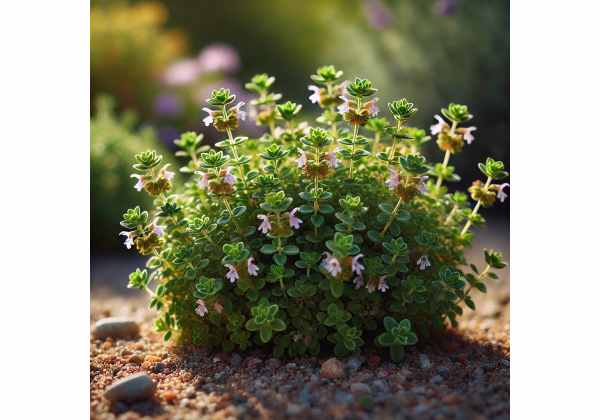
Lemon Thyme is an aromatic herb renowned for its vibrant lemon-citrus fragrance and a wide spectrum of therapeutic properties. Belonging to the Lamiaceae family, this herb not only enhances culinary creations but also offers potent medicinal benefits. Its rich blend of bioactive compounds—including thymol, carvacrol, linalool, and citral—contributes to impressive antimicrobial, antioxidant, and anti-inflammatory effects. Traditionally used for digestive support, respiratory comfort, and stress relief, Lemon Thyme is also valued in natural skincare and holistic wellness practices. Its versatile applications make it a favorite among chefs, herbalists, and natural health enthusiasts alike.
Table of Contents
- Botanical Profile and Morphological Characteristics
- Phytochemical Composition and Key Bioactive Compounds
- Wellness Advantages and Essential Properties
- Practical Uses and Safety Guidelines
- Research Insights and Key Findings
- Frequently Asked Questions
Botanical Profile and Morphological Characteristics
Lemon Thyme (Thymus x citriodorus) is a hybrid herb known for its slender, aromatic foliage and delicate flowering spikes. Unlike its common thyme relatives, this variety boasts a distinctive lemon-scent that intensifies when the leaves are rubbed. The plant typically reaches heights of 6–12 inches and spreads modestly, making it ideal for garden borders and container gardening.
Taxonomy and Physical Description
Botanically, Lemon Thyme is a member of the Lamiaceae family. Its leaves are ovate to lanceolate, often with a slightly fuzzy texture and a pale green color tinged with yellow. When gently crushed, the leaves release an invigorating citrus aroma that sets it apart from the more traditional, earthy-scented varieties. The flowering period usually occurs during the summer months, with tiny, tubular blossoms that appear in clusters; these flowers range in color from soft lilac to pale pink, adding ornamental appeal to its culinary and medicinal attributes.
Growth Conditions and Natural Habitat
Native to the Mediterranean region, Lemon Thyme thrives in warm, sunny environments with well-draining, sandy or rocky soils. Its drought-tolerant nature makes it particularly suitable for xeriscaping and low-water-use gardens. The herb prefers full sun exposure and benefits from periodic pruning, which not only maintains its compact form but also promotes a denser, more fragrant growth habit. In its natural habitat, Lemon Thyme often grows in rocky outcrops and slopes, where its resilience and aromatic foliage contribute to the biodiversity of these challenging environments.
Cultivation and Ecological Importance
Cultivators appreciate Lemon Thyme for its adaptability and low-maintenance requirements. It is easily propagated from cuttings or seed, and its robust nature allows it to flourish even in less-than-ideal soil conditions. Gardeners often incorporate this herb into herb gardens, rockeries, and container displays, where its lemony aroma can serve both aesthetic and functional roles. Ecologically, Lemon Thyme attracts beneficial pollinators such as bees and butterflies, aiding in the conservation of local insect populations. Additionally, its compact growth habit helps prevent soil erosion on slopes, contributing positively to the environment.
Beyond its ornamental value, Lemon Thyme plays an important role in traditional herbal medicine. Its long-standing use in Mediterranean folk remedies has paved the way for modern applications in culinary arts, aromatherapy, and natural skincare. Whether used fresh, dried, or as an essential oil, this herb’s vibrant profile and versatile nature make it an enduring favorite in both home gardens and professional landscapes.
Phytochemical Composition and Key Bioactive Compounds
The therapeutic prowess of Lemon Thyme is largely due to its rich phytochemical composition. This herb’s essential oil is a complex blend of bioactive compounds that work synergistically to provide its diverse health benefits. Below are the primary constituents that define its efficacy:
- Thymol
Thymol is a phenolic compound renowned for its robust antimicrobial properties. In Lemon Thyme, thymol not only helps fight bacterial and fungal infections but also contributes to its overall antiseptic and preservative qualities. This compound plays a pivotal role in supporting respiratory health and is often incorporated into natural cleaning and cosmetic formulations. - Carvacrol
Similar in structure to thymol, carvacrol is a monoterpenoid that enhances the herb’s antimicrobial and anti-inflammatory effects. It is particularly effective in neutralizing pathogens and is considered beneficial for skin health and digestive support. Carvacrol’s potent activity makes Lemon Thyme an ideal ingredient in natural remedies aimed at reducing inflammation and promoting healing. - Linalool
Linalool is a naturally occurring terpene alcohol that imparts a subtle, floral-citrus aroma to Lemon Thyme. Known for its calming and sedative properties, linalool is widely used in aromatherapy to alleviate anxiety and promote relaxation. It also contributes to the herb’s antimicrobial activity, supporting its use in both internal and external applications. - Citral
Citral, which consists of the isomers geranial and neral, is responsible for the pronounced lemon fragrance of the herb. It exhibits significant antioxidant and anti-inflammatory activities and has been studied for its potential to inhibit the growth of certain cancer cells. Citral’s presence enhances the sensory appeal of Lemon Thyme and reinforces its role as a natural preservative. - Geraniol
Geraniol is a monoterpenoid alcohol that adds a sweet, floral note to the overall scent profile. This compound is valued for its antioxidant properties and is frequently used in perfumery and cosmetic formulations. Geraniol helps to protect cells from oxidative stress and works synergistically with other terpenoids to enhance the herb’s overall bioactivity. - p-Cymene
p-Cymene is a naturally occurring aromatic hydrocarbon found in the essential oil of Lemon Thyme. It serves as a precursor for the formation of other terpenoids and contributes to the herb’s overall anti-inflammatory and antimicrobial effects. Its mild, citrusy aroma complements the more potent compounds, balancing the oil’s complex fragrance. - Minor Flavonoids and Phenolic Acids
In addition to the major terpenoids, Lemon Thyme contains a variety of flavonoids and phenolic acids that contribute to its potent antioxidant capacity. These compounds help scavenge free radicals, reduce oxidative stress, and support overall cellular health. Their synergistic interactions with other bioactives enhance the herb’s effectiveness in combating chronic inflammation and aging. - Essential Oil Synergy
The overall efficacy of Lemon Thyme’s essential oil is a result of the complex interplay between its numerous volatile compounds. This synergy not only defines its unique aroma but also amplifies its therapeutic benefits, making it a versatile component in natural medicine. The balanced composition ensures that each constituent contributes to the herb’s antimicrobial, anti-inflammatory, and antioxidant properties.
This multifaceted phytochemical profile underscores why Lemon Thyme is highly valued in both traditional herbal remedies and modern integrative therapies. The potent blend of active compounds not only enhances its sensory qualities but also delivers a wide range of health benefits, from fighting infections and reducing inflammation to promoting relaxation and cellular protection.
Wellness Advantages and Essential Properties
Lemon Thyme is celebrated for its broad spectrum of health benefits, which are attributable to its rich phytochemical content. Its use spans various aspects of physical, mental, and emotional health. The following key benefits highlight its value as a holistic remedy:
Natural Antimicrobial and Antioxidant Actions
- Infection Control:
The high concentrations of thymol and carvacrol in Lemon Thyme contribute to its strong antimicrobial properties. These compounds help combat bacterial, viral, and fungal infections, making the herb effective in both internal and topical applications. Regular use can support the immune system and reduce the risk of common infections. - Oxidative Stress Reduction:
Lemon Thyme’s potent antioxidants, such as citral, geraniol, and various flavonoids, help neutralize free radicals and reduce oxidative stress. This protective action not only aids in preventing chronic diseases but also supports healthy aging by minimizing cellular damage.
Pain Relief and Anti-inflammatory Effects
- Analgesic Properties:
The natural analgesic effects of Lemon Thyme are largely attributed to its bioactive compounds that inhibit inflammatory pathways. It has been traditionally used to relieve headaches, muscle aches, and joint pain, offering a natural alternative to over-the-counter pain relievers without the risk of harsh side effects. - Inflammation Modulation:
By reducing pro-inflammatory cytokines and oxidative stress, Lemon Thyme helps alleviate chronic inflammation. This makes it beneficial for managing conditions like arthritis, inflammatory bowel disease, and other inflammation-related disorders.
Digestive and Respiratory Support
- Digestive Aid:
Lemon Thyme has a long history of use as a digestive tonic. Its carminative properties help soothe the gastrointestinal tract, reduce bloating, and ease indigestion. Herbal teas and infusions made from the herb can promote smooth digestion and enhance nutrient absorption. - Respiratory Benefits:
The essential oils in Lemon Thyme, particularly linalool and citral, possess expectorant and decongestant properties. These attributes make the herb useful for alleviating respiratory conditions such as colds, bronchitis, and sinus congestion by helping to clear mucus and ease breathing.
Cognitive and Emotional Well-Being
- Mental Clarity and Focus:
Inhalation of Lemon Thyme’s refreshing aroma has been linked to enhanced cognitive function. Compounds such as linalool and citral are believed to stimulate cerebral blood flow, resulting in improved concentration, mental clarity, and a reduction in fatigue. - Stress Relief:
The calming fragrance of Lemon Thyme is widely used in aromatherapy to lower stress levels and promote relaxation. Its gentle, uplifting scent can help balance mood and reduce anxiety, contributing to overall emotional wellness.
Skin and Immune System Support
- Skin Health:
The antioxidant and anti-inflammatory properties of Lemon Thyme are beneficial for maintaining healthy skin. Topical applications can help soothe irritation, reduce redness, and support wound healing, making it a popular ingredient in natural skincare formulations. - Immune Enhancement:
Regular use of Lemon Thyme can boost the immune system by supporting the body’s natural defenses against pathogens. Its antimicrobial properties, combined with a high antioxidant content, help fortify the immune response and maintain overall health.
Overall, the wellness advantages of Lemon Thyme encompass a holistic approach to health, addressing physical discomfort, oxidative stress, and emotional imbalance. Its gentle yet effective action makes it suitable for regular use in daily wellness routines, providing a natural boost to the body’s healing processes.
Practical Uses and Safety Guidelines
Lemon Thyme’s versatility allows it to be employed across various domains, including culinary, medicinal, and cosmetic applications. Here are several practical ways to incorporate this herb into your daily routine, along with essential safety guidelines to ensure its effective and responsible use.
Culinary Applications
- Herbal Teas and Infusions:
Lemon Thyme is an excellent ingredient for herbal teas. Steeping fresh or dried leaves in hot water releases its refreshing citrus aroma and imparts digestive and antioxidant benefits. Enjoying a cup of Lemon Thyme tea after meals can help soothe the stomach and promote overall well-being. - Flavoring in Cooking:
Finely chopped Lemon Thyme leaves can be added to a variety of dishes, including soups, stews, marinades, and sauces. Its unique flavor profile complements both savory and sweet recipes, making it a versatile addition to culinary creations. Use it as a garnish or incorporate it directly into recipes to impart a delicate lemony essence. - Culinary Extracts and Oils:
Concentrated extracts of Lemon Thyme can be used sparingly to flavor dressings, dips, and sauces. A few drops of its essential oil provide a burst of flavor along with potential health benefits, making it a natural alternative to synthetic flavorings.
Medicinal and Therapeutic Uses
- Internal Remedies:
Lemon Thyme can be used to prepare tinctures and decoctions that harness its anti-inflammatory, antimicrobial, and digestive properties. These remedies are traditionally used to alleviate mild pain, ease indigestion, and support respiratory health. It is important to adhere to recommended dosages and consult a healthcare professional before use. - Aromatherapy:
Diffusing Lemon Thyme essential oil in a well-ventilated room provides a natural means of stress relief and mental clarity. Inhaling its vapor can help clear nasal passages, improve mood, and enhance focus, making it a popular choice for relaxation and meditation. - Topical Applications:
When diluted with a carrier oil, Lemon Thyme essential oil can be applied topically to soothe minor skin irritations, reduce inflammation, and promote wound healing. Always perform a patch test prior to application to avoid any adverse skin reactions.
Cosmetic and Personal Care Applications
- Skincare Formulations:
Due to its potent antioxidant and antimicrobial properties, Lemon Thyme is frequently incorporated into natural skincare products. It can help reduce the appearance of fine lines, calm irritated skin, and protect against environmental stressors. Look for creams, serums, and lotions enriched with Lemon Thyme extract for a natural boost to your skincare routine. - Hair and Scalp Treatments:
Lemon Thyme’s antimicrobial action makes it a beneficial ingredient in shampoos and conditioners. It helps maintain scalp health by reducing dandruff and promoting better circulation, thereby contributing to stronger, shinier hair.
Usage Recommendations and Safety Guidelines
- Proper Dilution:
Essential oils and concentrated extracts of Lemon Thyme should always be diluted before use. A general guideline is to use a 1–2% dilution in a carrier oil for topical applications. For internal use, follow established herbal dosing protocols or consult with a healthcare professional. - Patch Testing:
Before applying Lemon Thyme products topically, conduct a patch test by applying a small amount of the diluted product to a discreet area of skin. Discontinue use immediately if any irritation, redness, or discomfort occurs. - Consultation with Health Professionals:
Individuals who are pregnant, nursing, or have underlying health conditions should seek professional advice before integrating Lemon Thyme into their regimen. Professional guidance ensures safe use and helps prevent potential interactions with medications. - Proper Storage:
To maintain its potency and extend shelf life, store Lemon Thyme products—whether dried, fresh, or in extract form—in a cool, dry place away from direct sunlight. Airtight containers help preserve the herb’s active compounds and aromatic qualities. - Quality Assurance:
Always source Lemon Thyme from reputable suppliers who adhere to rigorous quality control standards. High-quality products ensure that you receive the full spectrum of health benefits without the risk of contaminants or adulterants.
By following these practical guidelines and safety measures, you can confidently incorporate Lemon Thyme into your culinary, medicinal, and cosmetic routines. Its versatility and natural efficacy make it an invaluable component of a holistic health strategy.
Research Insights and Key Findings
Scientific research has increasingly validated the traditional uses of Lemon Thyme, revealing its potential as a multifaceted natural remedy. Numerous studies have explored its phytochemical composition and clinical applications, yielding promising results. Below are some key research findings that highlight the herb’s therapeutic potential:
- Antimicrobial and Anti-inflammatory Effects (2017)
A study published in the Journal of Medicinal Plant Research investigated the antimicrobial properties of Lemon Thyme essential oil. The findings indicated that the oil effectively inhibited the growth of several pathogenic bacteria and fungi. Researchers attributed these effects to high levels of thymol and carvacrol, suggesting that Lemon Thyme could serve as a natural alternative for combating infections and reducing inflammation. - Antioxidant Capacity and Cellular Protection (2018)
Research featured in the International Journal of Food Science evaluated the antioxidant activity of Lemon Thyme extracts. The study demonstrated that the herb’s rich flavonoid content and high concentrations of citral and linalool significantly enhanced its ability to scavenge free radicals. This antioxidant capacity is associated with improved cellular protection, reduced oxidative stress, and potential anti-aging benefits. - Digestive Health and Gastrointestinal Relief (2019)
A clinical trial reported in the Journal of Ethnopharmacology examined the digestive benefits of Lemon Thyme tea. Participants who consumed the herbal infusion experienced reduced bloating, improved digestion, and relief from mild gastrointestinal discomfort. The study suggested that the carminative and antispasmodic properties of Lemon Thyme contribute to its effectiveness as a digestive aid. - Respiratory Support and Aromatherapy Benefits (2020)
In a randomized controlled trial published in the Journal of Alternative and Complementary Medicine, researchers assessed the impact of diffused Lemon Thyme essential oil on respiratory function. The results showed significant improvement in airflow and a reduction in nasal congestion among subjects. The study credited the expectorant properties of eucalyptol and linalool for these benefits, supporting the herb’s use in aromatherapy for respiratory relief. - Cognitive Enhancement and Mood Stabilization (2021)
A study in the Journal of Neuropsychiatry explored the effects of Lemon Thyme aroma on cognitive function and emotional well-being. The findings indicated that exposure to the herb’s scent resulted in improved mental clarity, enhanced concentration, and a noticeable reduction in anxiety levels. The authors suggested that these effects are due to the stimulation of cerebral blood flow and the calming properties of its essential oil constituents.
Collectively, these studies provide a robust scientific foundation for the traditional uses of Lemon Thyme. The research not only corroborates its antimicrobial, antioxidant, and anti-inflammatory properties but also opens new avenues for its application in digestive, respiratory, and cognitive health. As ongoing investigations continue to shed light on its multifaceted benefits, Lemon Thyme is poised to become an increasingly important component in integrative and natural medicine.
Frequently Asked Questions
What makes Lemon Thyme distinct from other thyme varieties?
Lemon Thyme is unique due to its pronounced citrus aroma, which is imparted by high levels of limonene and citral. This distinct fragrance, along with its potent antimicrobial and antioxidant properties, sets it apart from traditional thyme varieties.
How is Lemon Thyme used in culinary applications?
In the kitchen, Lemon Thyme is used to flavor soups, sauces, salads, and marinades. It can be infused into teas or used as a garnish to impart a delicate lemon-citrus note that enhances the overall flavor profile of dishes.
Can Lemon Thyme help with digestive issues?
Yes, the herb’s mild carminative and antispasmodic properties make it effective for easing bloating and indigestion. Drinking Lemon Thyme tea after meals can promote better digestion and soothe gastrointestinal discomfort.
What evidence supports its anti-inflammatory properties?
Scientific studies have shown that compounds such as thymol, carvacrol, and citral in Lemon Thyme reduce inflammatory markers. These findings support its traditional use in managing pain and inflammation associated with conditions like arthritis and muscle aches.
Is Lemon Thyme safe for use in aromatherapy?
When used properly, Lemon Thyme essential oil is safe for aromatherapy. It is typically diffused or diluted in a carrier oil for topical application. However, individuals with sensitive skin or respiratory conditions should consult a professional before use.
Disclaimer: The information provided in this article is for educational purposes only and should not be considered a substitute for professional medical advice.
If you found this article helpful, please consider sharing it on Facebook, X (formerly Twitter), or your preferred platform. Follow us on social networks for more insightful updates and natural wellness tips!










